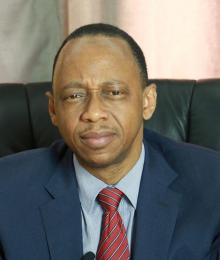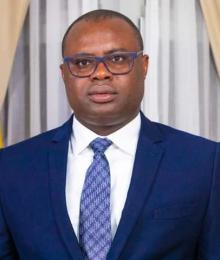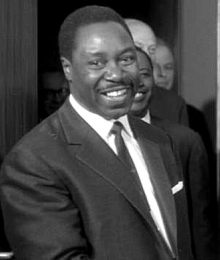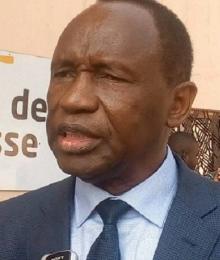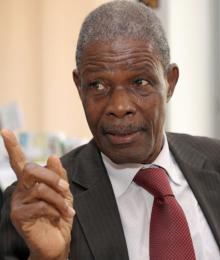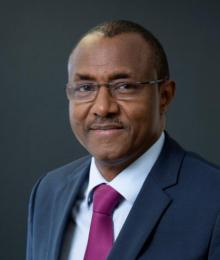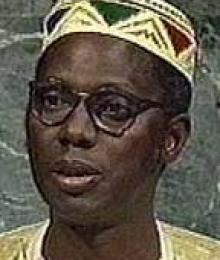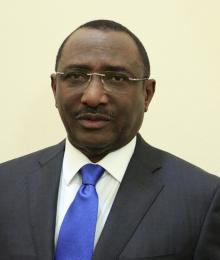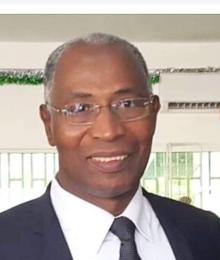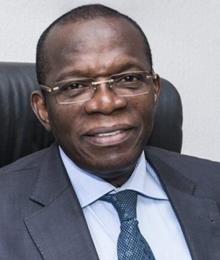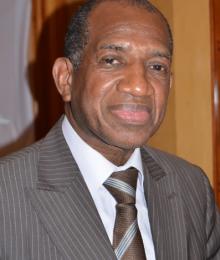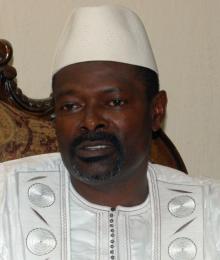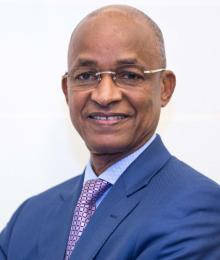
Cellou Dalein Diallo is one of the main political opponents and leading figures of democracy in Guinea. Born in 1952 in a modest people family, this trained economist climbed the ladder to become Prime Minister from 2004 to 2006, before being fired for his positions against the autocratic regime in place at the time. Since then, as head of the Union of Democratic Forces of Guinea (UFDG), the main opposition group, he has continuously denounced the authoritarian drift of successive powers and called for free and transparent elections.
Cellou Dalein Diallo failed three times to be elected president in the 2010, 2015 and 2020 polls, disputed for irregularities. After the coup that overthrew Alpha Condé in 2021, he had to go into exile in Dakar, pursued by the military junta. Despite threats and pressures, the 71-year-old "General" Diallo continues to fight tirelessly for the establishment of real democracy in Guinea, receiving many international awards such as the Africa Freedom Prize in 2022.
Introduction
Cellou Dalein Diallo is a leading Guinean economist and statesman. Born in 1952 in the region of Labé, he belongs to the peul ethnic group. Diallo held several ministerial positions and was Prime Minister from 2004 to 2006, before becoming the leader of the opposition and the chairman of the Union of Democratic Forces of Guinea party. (UFDG). Unfortunate candidate in the 2010 presidential election against Alpha Condé, he appeared again in 2015 and 2020, each time denouncing irregularities. After the 2021 coup, he was forced to exile in Dakar, where he continues to criticize the ruling military junta.
Education
Cellou Diallo was born on 3 February 1952 in Dalein, in the region of Labé. From a modest family, with a traditional chief father and a householder mother, he grew up in a brotherhood of nine children. Early in his life, he was instilled in the importance of education and continued his studies at Gamal Abdel Nasser University in Conakry, where he received a degree in economics.
Through a scholarship, Diallo went on to study at the Centre d'études financières, économiques et bancaires in Paris. On his return to Guinea, he completed his studies with degrees in public administration and finance. This solid academic background enables him to embark on a promising career in the Guinean public service.
Professionnal career
After graduating in 1976, Cellou Dalein Diallo was appointed Inspector of Commerce. He then joined the Bank of Foreign Trade of Guinea in 1982, before joining the Central Bank in 1985 where he climbed the ladder for a decade.
His financial expertise is recognised and he successively held the positions of Director of Accounting, Budget, Exchange and National Director of Economic and Monetary Affairs. His experience in the banking sector is worth raising to the rank of Minister in 1996.
Minister of several portfolios
In July 1996, Cellou Dalein Diallo was appointed Minister of Transport, Telecommunications and Tourism by President Lansana Conté. A year later, he became Minister of Infrastructure and, in March 1999, Minister of Public Works and Transport.
In this strategic position, he oversees major road, rail and port infrastructure construction sites across the country. Despite a controversy over an air crash in 2003, Diallo retained the confidence of the head of state.
In February 2004, he was transferred to the Ministry of Fisheries and Aquaculture, marking a slight ban before his surprise promotion to the rank of Prime Minister a few months later.
Prime Minister (2004–2006)
On 9 December 2004, in favour of a government change, Cellou Dalein Diallo was appointed Prime Minister by President Conté. He took office four days later as head of a reformed government.
As an economic reformer, Diallo is implementing a programme aimed at boosting growth, attracting foreign investment and developing entrepreneurship. At the same time, it is working to improve infrastructure, education and health services.
But very soon, disagreements broke out with the presidential circle, the powerful Secretary-General Fodé Bangoura. In April 2006, Diallo announced institutional reforms to increase his prerogatives, provoking the rage of the presidential clan.
A few hours later, he was expeditiously dismissed by Lansana Conté for "serious misconduct". A major setback for this ambitious reformist prime minister, which marks the beginning of his opposition to the regime.
Political career
Cellou Dalein Diallo resigned from office in 2006 and continued his political engagement. In November 2007, the Union of Democratic Forces of Guinea (UFDG), the main opposition party, chose him to take over the presidency.
He quickly structured this party, making it the backbone of the contest of President Lansana Conté's regime. After his death in late 2008, Diallo denounced a military junta taking power.
His resolute opposition was to be briefly arrested and placed under house arrest in 2009, then wounded during the bloody repression of a meeting in Conakry that year. But Diallo did not deviate from his line of firmness towards military power.
2010 presidential election
In 2010, when the democratic transition was finally organised, Cellou Dalein Diallo presented himself for the presidential election. He won the first round with 43.7% of the votes, but was defeated in the second round by historic opponent Alpha Condé, who won 52.5% of the vote.
Diallo disputed the results, arguing that interference and irregularities had distorted the vote. But the Supreme Court validated Condé's victory. Despite this failure, the UFDG reinforced its status as the main parliamentary opposition force.
Opposition leader (2010–2020)
During the following decade, he, now nicknamed "the General" by his supporters, continued his frontal opposition to Alpha Condé's regime. He denounces the president's authoritarian drift and economic drift, while his supporters are regularly repressed in the streets.
In 2015 and then in 2020, Cellou Dalein Diallo is again the opposition candidate in the presidential elections. Each time, he challenged the official scores that beat him, and called on his supporters to protest in an increasingly tense climate.
2020 presidential election
In the October 2020 presidential election, Cellou Dalein Diallo once again claimed victory over the outgoing Alpha Condé, despite the official results that granted him only 33.5% of the votes.
Clashes broke out, killing dozens of people. Diallo was briefly besieged by the security forces at his home, before being placed under house arrest for several days.
The post-election crisis then turned to a confrontation between the two camps, with the UFDG calling for civil disobedience. On a diplomatic level, Diallo and his party have the support of many foreign countries denouncing electoral irregularities.
2021 coup
In September 2021, a military coup finally overthrew President Alpha Condé, whose forcing for a third term had sparked tensions. At first, Cellou Dalein Diallo welcomed this military intervention, seeing an opportunity for change.
However, the country's new strong men, led by Colonel Mamady Doumbouya, settled in the long run. They are carrying out numerous arrests, including high-ranking officials of the fallen regime, and are postponing the holding of elections sine die.
Exile
Diallo's hope of a quick return to constitutional order was quickly disappointed. In April 2022, after the military refused to engage in a dialogue with the political parties, his home was invaded and then destroyed on the order of the junta.
Threatened with arrest, the opponent has no choice but to flee his country to Dakar in Senegal. Since his forced exile, he has multiplied condemnations of "the confiscation of power" by the military and calls for mobilization against the regime.
At the same time, he is being prosecuted in Guinea for illegal convening of meetings and defamation of the transitional authorities. An international arrest warrant was even issued against him in March 2023.
He is also being prosecuted for having been the main actor in the sale of Air Guinea while he was Minister of Transport.
Private life
TThro his busy career, Cellou Dalein Diallo has been able to count on the unwavering support of his family. Married and father of several children, he cultivates an image of a humble, pious and caring man to his own.
His wife Halimatou and some of their children also joined him in his Dakar exile. Very discreet about his personal life, the former Prime Minister rarely mentions his relatives, in order to protect them from pressure.
Honor and recognition
Despite persecution, Cellou Dalein Diallo remains an admired political figure, both in Guinea and internationally. In 2017, Human Rights Watch awarded her the Alison Des Forges Award for "extraordinary human rights activism".
The opponent also received the prestigious Naumann Foundation Prize for Africa's Freedom in 2022 for his "peaceful struggle against autocracy and mismanagement" in his country. A tribute to his tireless struggle for democracy.
On a partisan level, Diallo was re-elected twice, in 2015 and 2020, as head of the UFDG. A guarantee of the renewed confidence of its troops, even though its manoeuvre remains limited today by its forced withdrawal.
Conclusion
Cellou Dalein Diallo’s unusual journey illustrates the convulsions Guinea has experienced in recent decades. A reputed economist propelled to the highest spheres of the state, he later became the leader of a repressed opposition in a country marked by chronic political instability.
Despite the hardships faced by the Condé regime and then the military junta, the 71-year-old man has never ceased to fight for a democratic order in his country. His current exile in Dakar, far from being a retreat, seems rather a forced pause in this long struggle for freedom in Guinea.











